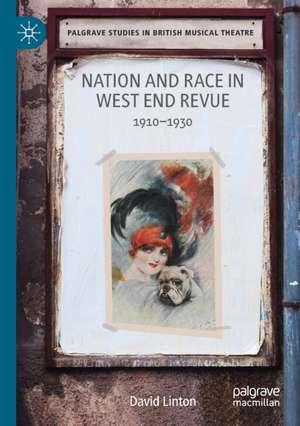Nation and Race in West End Revue: 1910–1930: Palgrave Studies in British Musical Theatre
Autor David Lintonen Limba Engleză Paperback – 2 aug 2022
| Toate formatele și edițiile | Preț | Express |
|---|---|---|
| Paperback (1) | 466.13 lei 6-8 săpt. | |
| Springer International Publishing – 2 aug 2022 | 466.13 lei 6-8 săpt. | |
| Hardback (1) | 639.90 lei 6-8 săpt. | |
| Springer International Publishing – aug 2021 | 639.90 lei 6-8 săpt. |
Preț: 466.13 lei
Preț vechi: 548.38 lei
-15% Nou
Puncte Express: 699
Preț estimativ în valută:
89.20€ • 95.38$ • 74.37£
89.20€ • 95.38$ • 74.37£
Carte tipărită la comandă
Livrare economică 17 aprilie-01 mai
Preluare comenzi: 021 569.72.76
Specificații
ISBN-13: 9783030752118
ISBN-10: 3030752119
Pagini: 202
Ilustrații: VII, 202 p. 1 illus.
Dimensiuni: 148 x 210 mm
Greutate: 0.28 kg
Ediția:1st ed. 2021
Editura: Springer International Publishing
Colecția Palgrave Macmillan
Seria Palgrave Studies in British Musical Theatre
Locul publicării:Cham, Switzerland
ISBN-10: 3030752119
Pagini: 202
Ilustrații: VII, 202 p. 1 illus.
Dimensiuni: 148 x 210 mm
Greutate: 0.28 kg
Ediția:1st ed. 2021
Editura: Springer International Publishing
Colecția Palgrave Macmillan
Seria Palgrave Studies in British Musical Theatre
Locul publicării:Cham, Switzerland
Cuprins
Chapter 1: Reading London West End Revue.- Chapter 2: Revue in the Modern World: Possibilities and Perils -West End Identities.- Chapter 3: New Insecurities, New Form, New Identity- National Identity and Raciologies in Eightpence a Mile (1913).- Chapter 4: Degeneration/Regeneration – The Remaking of Nation in Wartime West End Spectacular Revue.- Chapter 5: Blackbirds in London: Black Internationalism and the Black Imaginary.- Chapter 6: Class Distinction and National Identity in 1920s West End Intimate Revue.
Notă biografică
David Linton is a performer/theatre practitioner and senior lecturer in Drama at Kingston University, London, UK. His research explores issues of resistance, adaptation, and exchange in theatre. This focuses on participatory arts practice, black British performance and pre-modern popular theatre forms, and their contemporary applications, specifically mask/minstrelsy, pantomime, burlesque/neo burlesque, cabaret, pierrot, hip hop theatre, and revue.
Textul de pe ultima copertă
London West End revue constituted a particular response to mounting social, political, and cultural insecurities over Britain’s status and position at the beginning of the twentieth century. Insecurities regarding Britain’s colonial rule as exemplified in Ireland and elsewhere, were compounded by growing demands for social reform across the country — the call for women’s emancipation, the growth of the labour, and the trade union movements all created a climate of mounting disillusion. Revue correlated the immediacy of this uncertain world, through a fragmented vocabulary of performance placing satire, parody, social commentary, and critique at its core and found popularity in reflecting and responding to the variations of the new lived experiences. Multidisciplinary in its creation and realisation, revue incorporated dance, music, design, theatre, and film appropriating pre-modern theatre forms, techniques, and styles such as burlesque, music hall, pantomime, minstrelsy, and pierrot. Experimenting with narrative and expressions of speech, movement, design, and sound, revue displayed ambivalent representations that reflected social and cultural negotiations of previously essentialised identities in the modern world. Part of a wide and diverse cultural space at the beginning of the twentieth century it was acknowledged both by the intellectual avant-garde and the workers theatre movement not only as a reflexive action, but also as an evolving dynamic multidisciplinary performance model, which was highly influential across British culture. Revue displaced the romanticism of musical comedy by combining a satirical listless detachment with a defiant sophistication that articulated a fading British hegemonic sensibility, a cultural expression of a fragile and changing social and political order.
David Linton is a performer/theatre practitioner and senior lecturer in Drama at Kingston University, London, UK. His research explores issues of resistance, adaptation, and exchange in theatre. This focuses on participatory arts practice, black British performance and pre-modern popular theatre forms, and their contemporary applications, specifically mask/minstrelsy, pantomime, burlesque/neo burlesque, cabaret, pierrot, hip hop theatre, and revue.
Caracteristici
Fills a gap in understanding how and why London West End revue was such an exciting, popular and influential form throughout the twentieth century Challenges previous theatre historiographies and calls for a new understanding of how popular musical performance forms operate Connects diverse popular theatre genres, and in doing so links revue to contemporary practices across theatre and performance today




